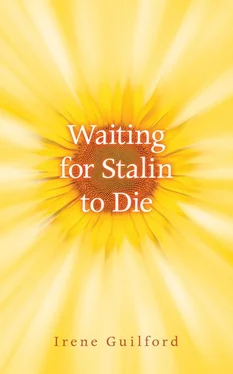“Okay.” Then with a mischievous smile he added, “After baseball practise. But please don’t forget Mozart.”
He placed an arm across his stomach. He bowed. Then he raced out of the room.
Justine looked after him, her mouth twitching with delight. Opening her purse, she took out a crumpled letter, one line on a sheet of yellow paper. If you are ever in Paris, come and see me. She heard the faint sound of traffic. She crumpled it in her hand. And tipping her head as if listening to a distant music, she heard the beating of her own heart.
It was like meeting a lover. Leaving peeled potatoes standing in a pot of cold water on the stove, she went out every Thursday at 4 pm. It’s not right, she thought, shifting her daughter on her hip, but she couldn’t stop her feelings. She wanted to be with Eddie more than with her own child.
The boy’s hands fell naturally into chords. His arms lifted in light graceful arcs. He sight-read with no effort. He practised diligently. A gazelle at the piano, he needed only her presence and the odd guiding word.
She would settle down next to him, placing her daughter on the ground. Turning towards the whimpering child, she would shush her. She tried to make her attention rest there. It slid away. Before she knew it, she was back with Eddie and music, Veronika forgotten.
On the way home she would jiggle her up and down on her hip. Unstrapping the thin clinging arms from around her neck, she would set the girl down in the street. Uncle Povilas can toss children up and down in the air, she thought, but I have no such talent. Mine is for making music. And grabbing the child by the hand, she would drag her home.
She would find a husband displeased at having to wait for his dinner. Standing at the stove, boiling the potatoes, she would catch his hostile sideways look. Who’s more important? Me and your daughter? Or that boy? And silence settled between them, a no man’s land that she made no attempt to cross.
After dinner the child would crawl towards Steponas’ feet, trying to clamber up his pant leg. Laying down his newspaper, he would bend down to scoop her up. I can’t make myself love you, she thought, watching the child gurgle in his arms with delight. Not in the right way. And knowing that it wasn’t fair or right, she would think of Eddie, a bright-faced boy who, one day, would leave her but, until then, was hers.
FATHER GERAS

TORONTO

1953
They had run through the woods, evading soldiers.
Falling to the forest floor, he had pulled his sister down with him. He had lain atop her, one hand covering her mouth. Leaves rustled with the footsteps of passing soldiers. When all was silent again, they had risen, pulled the twigs out of their hair and continued on.
Run, their mother had said. Take freedom.
Take it, as you take my heart.
She would not come with them. He would not let himself think of what might have befallen her.
He thought only of his sister and survival.
Later, he heard that she had died not long after their leaving, and his heart had died, too.
One day, he would return. On bended knee, he would place flowers on her grave. He would bow his head and whisper the words that needed to be said.
He would return his heart.
Chapter 1

Father Geras stood on the church steps after Sunday mass, looking out over the hubbub of parishioners. Milling about on the sidewalk, spilling into the street, they had collected in numbers no one had expected. Hopes sharply risen at the news of Stalin’s death were beginning to fade. There would be no imminent return home. And letting his eyes linger upon his people, he sensed their restless unease.
Where will I bury them all? he thought. They had survived the war but continued to die.
The church entrance was on Gore Vale Avenue, the rectory on Dundas Street. Rounding the corner, going from rectory to church, he felt as if he were leaving the earthly world for an atmosphere more rarefied. In the peaceful church quiet he moved amid his own thoughts. In this simple space, dreams were kept alive. And returning to the plain twostory brick building, he re-entered daily practical life.
His sister Birute flew out of the kitchen. She flung her arms around his neck, nuzzling him.
“Stop that,” Jurgis said, disengaging her with a laugh. A priest could not have his sister nuzzling him, not even at home.
“No, I won’t,” she said, hanging on in happy mischief.
“That’s enough. I have work to do.”
“Oh, you’re always working. What about me?”
“You have work to do, too.”
“Oh, who wants to spend all day cooking for priests? I want to be out in the world like you.”
“Don’t talk like that. This is a holy place. A house of God. I live here. And so do you.”
“Yes, but you go out. I’m stuck in God’s house all day long.”
Birute, his wayward sister whom he’d caught behind the barn with a farmer’s son. Pulling the boy off, sending him packing with a cuff, he’d scolded her. She’d stood swinging her hips from side to side. She’d sucked her thumb. Naughty mischievous Birute, always on the brink of trouble, needing constant watching.
“I’m hungry,” he said. “Lunch.”
Afterwards he stood in his bedroom, examining himself in the small round mirror above the bureau. Tugging at the bottom of his square-cut jacket, he adjusted the set of his suit. He picked a piece of lint off the dark fabric. He smoothed his black hair. And looking his priestly best, he set off to meet Mr. Lambert, a Canadian with land to sell.
He stepped into the quiet Sunday afternoon street. Tipping his head back, he squinted at the clear sky. The clean Nordic blue was not unlike that of home. The same sky stretches over all of us, he thought, no matter where we are. And putting on his black fedora, he went out in search of a place of rest for his people.
Jurgis never blamed his mother for taking a lover. Living with a harsh husband and four sons moulded in his image, she had turned to her husband’s brother for love. Raimundas was kind to her. Jurgis basked in his mother’s happiness. And drawing close to her, resting against her once-again pregnant body, he understood that Uncle Raimundas was his father.
His father and uncle fought in the centre of the village, pummelling one another in the dust. Standing beside his mother, slipping his hand into hers, Jurgis had gazed up at her swelling belly. The fight changed nothing except that, after Birute, there would be no more children. Keeping a tight inner circle, they remained a private family of three.
He had entered the priesthood at Uncle Raimundas’ urging. Leaving the farm, escaping a father who hated him, and four older brothers who chased and beat him, he was not sorry. He studied but felt no vocation. Giving mild sermons about minor misdeeds, he dispensed good will as best he could.
Читать дальше
















